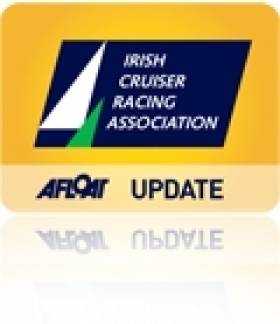Displaying items by tag: Jim Donegan
National Award for Irish Cruiser Racing Association (ICRA)
In the three decades and more of the Mitsubishi Motors/Irish Independent "Sailing Club of the Year" assessments, there has never been an organization only seven years old winning the title.
In fact, seniority has often won the day, though in a country in which the oldest sailing clubs date from 1720 (Royal Cork) and 1770 (Lough Derg), it's difficult to find clubs and associations which are anything less than centenarians, let alone not yet in double figures.
But it was only as recently as June 2003 that the Irish Cruiser Racing Association came into being. It was at the biennial Sovereign's Cup series in Kinsale that Fintan Cairns of Dun Laoghaire, enthusiastically supported by the late Jim Donegan of Cork and other key personnel, successfully launched the idea of a nationwide organisation to co-ordinate the racing sport of "boats with lids".
At the time, it was a leap of vision. Having successfully headed Dublin Bay Sailing Club at a time of rapid growth, he was able to see the picture more clearly than those who reckoned that offshore racing organisations should be related to bodies of water rather than a land mass, for all that we're on an island.
Then too, the new association was envisaged as using established clubs and their facilities to stage its championship. In other words, the ICRA organising team would be the travelling people of the Irish sailing scene. On top of that, handicap competition with cruiser-racers was derided as "truck racing" by the white hot one design and dinghy sailors.
Yet the idea took hold, and the annual championship was successfully staged at venues as various as Crosshaven, Tralee, Howth, Kinsale and Dun Laoghaire, with Denis Kiely the essential ace number-cruncher in the back office. And in May 2010, with the mighty machine of the Royal St George YC in Dun Laoghaire providing the administrative centre, the Liebherr Irish Cruiser Nationals in Dublin Bay attracted a fleet of 117 boats, with great sailing.
On that event alone, ICRA would have been among the front runners for Club of the Year. But the best was yet to come. In recessionary times, getting a three boat team together to make a worthwhile challenge for the biennial Rolex International Commodore's Cup was a matter of making the best of limited resources. But ICRA – currently under the leadership of Barry Rose of Cork - was up to the job.
The team of Anthony O'Leary's Antix, Dave Dwyer's marinerscove.ie, and Rob Davis and Andrew Creighton's Roxy 6, had a convincing win. Thus ICRA in one season had catered very well for general run of boats and crews at home, and had come out tops at the top level internationally. It doesn't get better than that, and we salute them as Sailing Club of the Year 2011.
























































